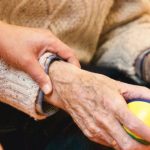Hydration is a vital part of your overall nutrition and wellbeing. Yet it often goes ignored, with 89% of the British population not drinking enough water to maintain healthy hydration levels.
This is particularly the case for adults aged over 55, with 25% admitting to drinking no water at all during the day.
But what does hydration actually refer to, does it just mean drinking water? And why is it so important that we stay as hydrated as possible?
What Is Hydration?
Hydration is the process whereby the body receives enough water to maintain normal levels of physical function, cognitive function, and thermoregulation.
The opposite of hydration is dehydration, which takes place when the body does not have enough water within the body to carry out the functions listed above at optimal levels.
Water referred to in this instance is as a nutrient, which is found in all fluids (including drinking water) and the food we eat.
The European Food Safety Authority (EFSA) recommend a minimum daily water intake of 2.5 litres for men and 2.0 litres for women, with 70-80% coming from fluids and the remaining 20-30% from food.
Why Is Hydration So Important?
The reason hydration is so important to our overall health, is because of the vital role it plays in our bodies processes.
One of the areas most affected by a lack of water is the brain, which is nearly 75% water. As little as 1% dehydration can negatively affect your mood, attention, memory and motor coordination.
But the undesirable effects of dehydration aren’t limited to the brain.
As your body naturally loses water throughout the day, your blood becomes more concentrated which eventually triggers your kidneys to hold on to the water you have left.
This has several negative consequences.
Firstly, the more your blood becomes concentrated, the harder your cardiovascular system has to work in order to maintain both heartrate and blood pressure. This is why dehydration can often lead to fainting caused by low blood pressure.
Similarly, water retention in the kidneys can lead to painful urinary tract infections (UTIs) such as cystitis. Hydration also plays a vital role in temperature regulation, and a lack of water can lead to hyperthermia (a situation where body temperature soars).
Tips for Staying Hydrated?
There are many simple steps you can take to ensure you’re getting enough water into your body each day:
- Track your body weight and make sure to stay within 1% of your normal baseline. (To get your baseline, weigh yourself at least three times first thing in the morning and take an average).
- Monitor your urine. You should ideally urinate at least 5 times a day, and it should be a pale straw colour. If it strays to a darker colour and begins to have an odour, then make sure to take on more fluids.
- Try and stick to conventional bottled or tap water since it doesn’t contain the harmful amounts of sugar present in many soft drinks.
- Limit your consumption of diuretic substances such as caffeine and alcohol.
- Be more conscious of your hydration, and set reminders on your phone to get a drink. Don’t wait until you are thirsty, as your body is already dehydrated at this point.
It’s Time to Take Your Hydration Seriously
Hydration may seem low on the priority list when it comes to health and nutrition, but even small changes in hydration levels can have dramatic effects on the body.
Our own hydration tool is coming soon in the DocHQ app (App store and Google Play). It will send you timely reminders to get a drink throughout the working day, so you don’t ever suffer the negative effects associated with dehydration. Sign up to get notification of when our hydrate tool goes live.
If you do indeed feel that you are suffering from the effects of dehydration, you can also use the in-app symptom checker to receive suggestions for what to do next.
Other blogs that may interest you around: Sleep, Superfoods, Exercise, Thinking strategies to combat stress.
DocHQ Ltd is a Health Tech company improving choices. We help you connect efficiently to health support and advice whether you are at home, work or travelling. See our website for our services or call us on 0330 088 0645.



